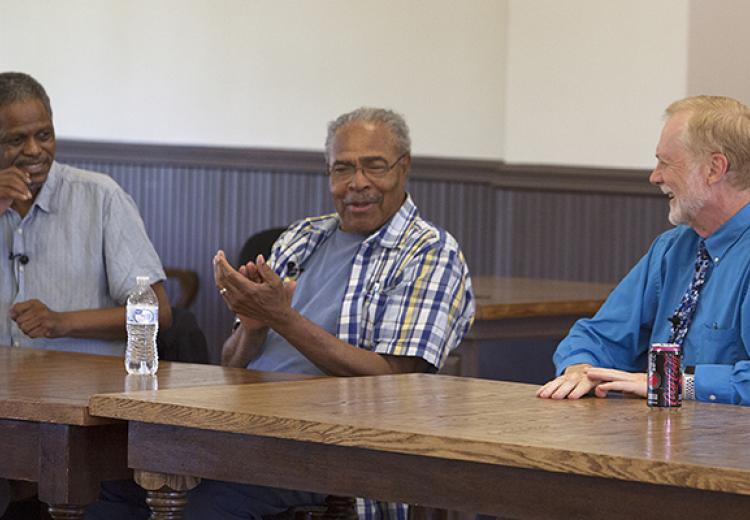Truth and Memory in the Mississippi Delta: What the Emmett Till Case Means Today

Panelists Alvin Sykes, Wheeler Parker, and Jerry Mitchell
Rolando Herts, PhD, Director, The Delta Center for Culture and Learning, Delta State University, Cleveland, Mississippi
On the same day when the New York Times, the Washington Post, and other national media outlets announced the reopening of the Emmett Till case, 36 K-12 educators from across the country were gathered for a panel discussion in the Tallahatchie County Courthouse, where the Till murder trial took place in 1955.
For nearly a decade, The Delta Center for Culture and Learning at Delta State University has hosted the National Endowment for the Humanities Most Southern Place on Earth Institute. The summer program immerses K-12 teachers in the physical and cultural landscape of the Mississippi Delta National Heritage Area, considered the “cradle of American culture” by the National Park Service and a National Treasure by the National Trust for Historic Preservation.
“Visiting the places where history happened and hearing from people who lived it is truly impactful,” said Dr. Rolando Herts, director of The Delta Center and executive director of the Mississippi Delta National Heritage Area. “That’s what this program is about. Given today’s news, this panel discussion is sure to be unforgettable for our NEH Most Southern participants.”
In previous years, The Delta Center’s Emmett Till panel included Till’s relatives Wheeler Parker and Simeon Wright. Both Parker and Wright were with Till at Bryant’s Grocery Store in Money, Mississippi, where Till was accused of sexually assaulting Carolyn Bryant.
Wright passed away in September 2017, fueling concerns that authentic voices of primary sources are leaving and cannot be included in the new investigation.
“Many of the documentaries and books that have been done about the Till case did not include us,” said Parker to the audience of captivated teachers and community members gathered in the historic courtroom. “Simeon and I were actually there, yet we rarely have been asked what really happened. Our goal today is to tell the truth.”
But the truth is not entirely clear, argued panelist Alvin Sykes, a Kansas City-based civil rights activist. Sykes figured prominently in the Till case being opened in 2004 and the Emmett Till Unsolved Civil Rights Act being enacted in 2009.
“Today’s news reconfirms our belief that the Department of Justice and FBI continue to be fully committed to doing a thorough investigation, to doing everything possible to uncover the truth of what happened with Emmett Till,” said Sykes. “It is important, though, for us not to read too much into it, because evidence is still being uncovered and hurdles are significant. Among those hurdles are passage of time, fading memory, and the loss of people who experienced this history,” said Sykes.
“The truth changes over time, as memories fade and social opinions shift,” said Dr. Linda Beito, Stillman College political science professor and co-author of the new book T.R.M. Howard: Doctor, Entrepreneur, Civil Rights Pioneer.
“We found this while conducting our research on Dr. T.R.M. Howard, a once famous civil rights activist who is lost to history. He actually hosted Mamie Till in his home in Mound Bayou while she was in the Mississippi Delta during the trial in 1955. So few people know that, because many of the people who lived and witnessed that history are gone now. Moreover, their voices often were not included while they were alive because of their race and lower socioeconomic status.”
On the same day as the Till panel, she and book co-author (and husband) Dr. David Beito shared highlights of T.R.M. Howard’s life when the teachers visited Mound Bayou, known as the “Jewel of the Delta,” during the historic black town’s 131st Founders Day celebration.
“Today’s news about the Till case lets us know that our research on T.R.M. Howard, on Emmett Till, and on Mamie Till has not been done in vain,” said David Beito. “We are helping to preserve these stories for the next generation, for groups like these teachers who are passing it along to the next generation in school communities across the nation.”
When Parker is asked whether or not the passage of time has affected his ability to recollect the events that occurred leading up to Till’s murder, he answers with certainty.
“When you have lived this history, you never forget it,” said Parker. “That’s the truth.”
Media contacts:
Rolando Herts, Ph.D. (story), rherts@deltastate.edu
Mike Fagans (photos), mike@michaelfagans.com
